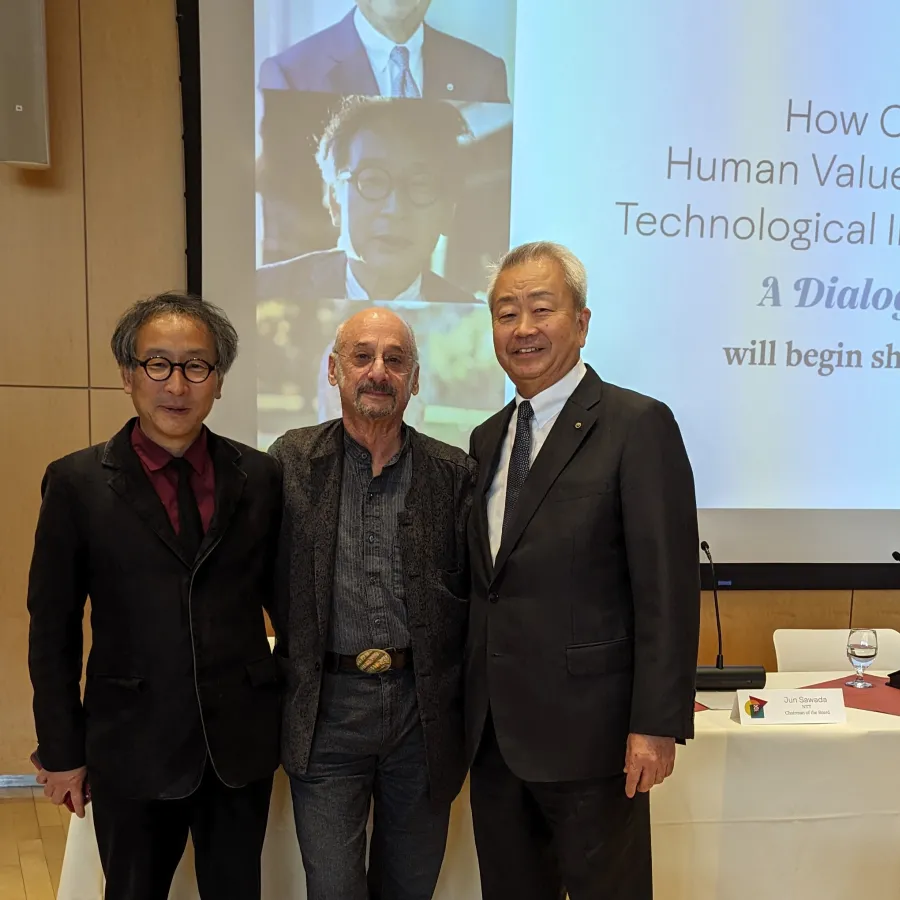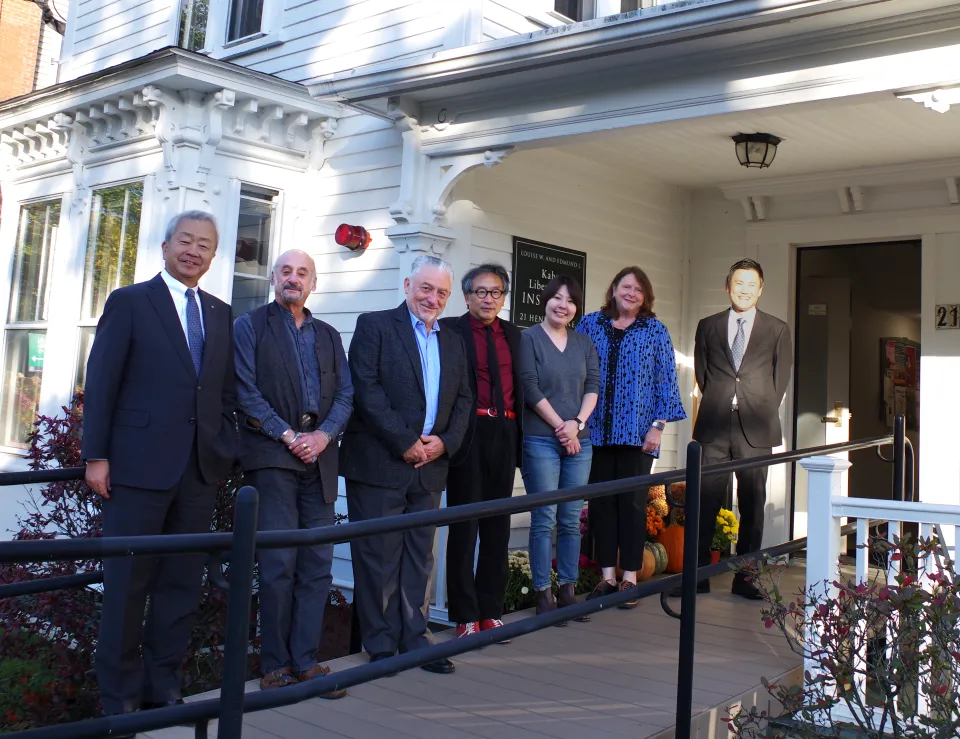From Atom to Molecule: Reflections on Jun Sawada and Yasuo Deguchi’s visit to Smith College
Research & Inquiry

Yasuo Deguchi, Vice Provost for Humanities at Kyoto University, Jay Garfield, Doris Silbert Professor in the Humanities and Professor of Philosophy, Logic and Buddhist Studies, and Jun Sawada, Chairman of the Board, NTT.
Published December 12, 2023
To read this, you probably had to log into a few different systems—your computer, your email, your phone. That action symbolizes the individual, “atomistic” approach to technology—one that is being questioned by engineers and philosophers.
The question raised at a recent panel sponsored by the Kahn Institute at Smith College is how would technology change if we were to recognize we are all molecules, dependent on one another?
That is the approach favored by Jun Sawada, chairman of the board of NTT, one of the largest telecommunications and artificial intelligence companies in the world and one of three panelists for “How Can Human Values Inform Technological Innovation? A Dialogue.”
At the event, Sawada, Yasuo Deguchi, Vice Provost for Humanities at Kyoto University, and Jay Garfield, Doris Silbert Professor in the Humanities and Professor of Philosophy, Logic and Buddhist Studies at Smith, proposed a “we-turn" that would encourage technological innovators to be in conversation with humanities scholars about the potential ethical dilemmas their innovations might pose.
The panel was part of a day-long visit by Sawada and Deguchi to Smith, which included an introduction to the Picker Engineering Program and a faculty seminar at the Kahn Institute to discuss “Developing, Deploying, and Managing Technology for Community: Engineering Informed by Human Values.”
Sawada, Deguchi, and Garfield, along with colleagues at other institutions, will launch the Kyoto Institute of Philosophy this coming January to facilitate a meeting of minds between humanities scholars and technical innovators. They plan to host the Kyoto Conference as an alternative to the World Economic Forum Annual Meeting, known colloquially as “Davos”; they will gather thinkers and doers from around the world to discuss how society’s ethics must inform technological progress. Sawada offered the example of NTT turning from electronics to photonics–a change that will result in much less energy needed to power our devices, but will also have unforeseen consequences on society that humanities scholars can help envision.
During Sawada and Deguchi’s visit, Helen Sher ’24 led them on a campus tour. “All of the guests were so excited and interested to see and learn about the campus,” she reflected. “They also asked some of the best questions I've had in a while about our facilities and student life on campus.” They were particularly interested in “our international student pre-orientation as well as ISO (the International Student Office) and the opportunities that all students have to pursue study abroad programs across the world.”

Sawada, Garfield, Vito Mabrucco, Global CMO, NTT Corporation; Deguchi, Maiko Tsuji, Philosophy, Kyoto University; Suzanne Gottschang, Kahn Institute Director; and Shota Araki, Office of the Chairman, NTT.
Read on to discover what faculty had to say about the visit.
Andrew J. Guswa, Engineering professor and co-organizer
The panel discussion raised some provocative questions around how technologies could be increasing or eroding connection and community. An anecdote of families and neighbors spending evenings outside to keep cool – and naturally engaging with each other – was contrasted with the insular life made possible by air conditioning. Extrapolating, one wonders whether all technological advances, which seek to increase comfort and efficiency, have the unintended effects of reducing our relationships with those nearby and increasing our dependence (and need to trust) others at a distance, with whom we may not have a relationship. This notion was further explored by Yasuo Deguchi, who noted that the point of entry to “the internet” is individual and atomistic (through an individual account, device, computer,...). Could we imagine a situation which centers the “we” rather than the “I”?
Those ideas and others were explored more deeply during the two-hour seminar at the Kahn Institute. Participants with expertise in public policy, globalization, international affairs, theater, engineering, and philosophy explored themes related to technology, innovation, power, capitalism, unintended consequences, individuality, and community. Conversations were generative and expansive, and the multiple disciplinary backgrounds provided a diversity of perspectives that stretched my brain to think in new ways.
Jay Garfield, Doris Silbert Professor in the Humanities and Professor of Philosophy, Logic and Buddhist Studies and co-organizer
Jun Sawada is not your typical multinational CEO or Chairman. He is an erudite, thoughtful man deeply concerned not about the bottom line, but with making his vast corporation a force for good in the world, and for the creation of community. His establishment of the Kyoto Institute of Philosophy and his seeking of partnership with scholars of the humanities as well as with like-minded scientists and engineers at Kyoto University and Smith represents a first step in this direction. He hopes thereby to open a dialogue in which industry, academia, Asia, the global south, and the West are all represented in an effort to construct a new foundation for the philosophy of technology. Our colleagues at Kyoto University, prominently including Prof. Yasuo Deguchi, Vice Provost for Humanities and Chair of the Philosophy department, are on board. The events of 24 October gave the Smith community a chance to join this conversation.
Our discussion revealed both shared commitment to this project and the enormity of the work to be done. Fundamental concepts—including the concept of community, of technology, of policy, and of autonomy—remain in need of clarification. The specific methods by means of which these might be clarified, and by means of which we might make joint progress remain to be developed. And we have yet to bring all of the necessary conversation partners to a single table. But we have made a start, and it is a promising start. Ideas were debated in good faith, and we each came to see the questions we are asking with greater clarity and focus. That is an important start. Deepening the relationship between Smith and partners in Kyoto University, the Kyoto Institute of Philosophy and NTT can only benefit all parties, and all constituencies within the Smith College community.
Greg White, Political Science professor
I deeply valued the connection and intellectual exchange at the afternoon seminar. The caliber of thinking, the "fresh thoughts" that come from engagement with colleagues in different fields... We all think all the time, of course, but it's fun and valuable to think anew. And the Kahn prompts that.
I was especially intrigued with the challenges of anticipating unintended consequences when there are such imperative incentives to develop new technologies...
I'm grateful to the organizers, the Kahn, and to our visitors for an engaging/provocative session.
Andrea Hairston, Louise Wolff Kahn 1931 Professor Emerita of Theatre and novelist
I was struck by the richness of the face-to face conversation. It was a hopeful exchange.
We demonstrated the power of live engagement, of being present to one another, of challenging and extending our minds in the moment we shared.
As we considered the challenges and opportunities presented by new technology, we focused on values, on pluralism, on the centrality of WE-ness. Grounding in philosophy and ethics as we design our world is imperative. So is systems thinking. Instead of preying on human weaknesses, new technology could enhance/extend our strengths. This approach can be sustainable and profitable. Coming from multiple disciplines and perspectives, all the participants spoke to the need for a diversity of voices at the table as we create the technologies that will sustain our various communities. These technologies should aid us in engaging with contradictions and conflict and in sharing power and possibilities.
And yes, I will use all of this as I work on my current novel projects.
Susannah Howe, Director of the Design Clinic and Senior Lecturer in Engineering
I look forward to continued conversations with our colleagues at NTT and KIP as we envision ways to collaborate in the years to come. The Picker Engineering Program, embedded within the liberal arts environment of Smith, is an apt partner for discussions at the intersection of technology, innovation, and human values.
Header image caption: Yasuo Deguchi, Vice Provost for Humanities at Kyoto University; Jay Garfield, Doris Silbert Professor in the Humanities and Professor of Philosophy, Logic and Buddhist Studies; and Jun Sawada, Chairman of the Board, NTT.